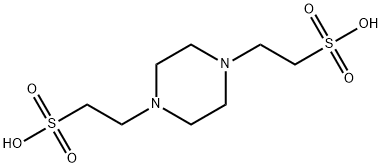PIPES: properties, applications and safety
Nov 10,2023
General Description
1,4-Piperazinediethanesulfonic acid (PIPES) is a versatile compound used as a buffering agent in biological and chemical research. It helps maintain a stable pH range and is resistant to temperature fluctuations. PIPES finds applications in cell culture, enzyme assays, protein purification, electrophoresis, and electron microscopy. Safety precautions include proper storage, wearing protective gear, and avoiding contact, inhalation, or ingestion. Overall, PIPES is a valuable tool for maintaining pH stability and is widely utilized in various scientific investigations.

Figure 1. PIPES
Properties
1,4-Piperazinediethanesulfonic acid, also known as PIPES, is a chemical compound widely used in biological and chemical research laboratories. It is a zwitterionic buffer that helps maintain a stable pH range in various experimental conditions. The chemical formula of PIPES is C8H18N2O6S2, indicating its composition of carbon, hydrogen, nitrogen, oxygen, and sulfur atoms. It has a molecular weight of approximately 302.37 grams per mole. PIPES is highly soluble in water, making it convenient for preparing buffer solutions with a desired pH. Its pKa value, which represents the acidity or basicity of a compound, is around 7.0. This means that PIPES is effective at maintaining a near-neutral pH environment, especially in the physiological pH range. One of the notable characteristics of PIPES is its resistance to changes in pH caused by temperature fluctuations. This property makes it suitable for use in experiments that involve temperature-sensitive samples or reactions. Additionally, PIPES has a low UV absorbance, which minimizes interference with spectroscopic measurements. In conclusion, PIPES is a versatile chemical compound frequently employed as a buffering agent in biological and chemical research. Its ability to maintain a stable pH, resistance to temperature changes, and compatibility with biological systems make it a valuable tool in scientific investigations. 1
Applications
PIPES is a buffering agent commonly used in biochemistry and molecular biology applications. It is a zwitterionic compound that can maintain a constant pH level between 6.1 and 7.5, making it useful for a wide range of applications. One of the major applications of PIPES is in the preparation of biological buffers for cell culture and other biochemical assays. PIPES can be used to stabilize the pH of cell culture media, as well as to prevent changes in pH during enzyme assays and protein purification. Additionally, PIPES is also used in the preparation of electrophoresis buffers, particularly for polyacrylamide gel electrophoresis (PAGE). It helps to maintain a constant pH during the electrophoresis process, preventing changes that could affect the movement and separation of the molecules being analyzed. Another application of PIPES is in the preparation of solutions for electron microscopy. PIPES can be used as a component of fixative solutions and embedding media, helping to preserve the structure of biological samples for analysis under the electron microscope. Overall, PIPES is a versatile and widely used buffering agent with a variety of applications in biochemistry and molecular biology. 2
Safety
PIPES is a white crystalline solid commonly used in biochemical and pharmaceutical research laboratories. When handling PIPES, it is essential to follow proper safety precautions. Firstly, PIPES should be stored in a cool, dry place away from sources of heat or ignition. It should be kept in a tightly sealed container to prevent moisture absorption and contamination. Additionally, it is crucial to wear appropriate personal protective equipment, including gloves, goggles, and a lab coat, when working with PIPES. PIPES is considered moderately hazardous if ingested, inhaled, or comes into contact with the skin or eyes. In case of contact, immediately rinse the affected area with plenty of water for at least 15 minutes. If swallowed, seek medical attention without delay and provide the healthcare professional with all relevant information about the compound. Furthermore, PIPES may cause respiratory irritation if inhaled. Therefore, it is recommended to work in a well-ventilated area or use fume hoods when handling this substance. Avoid creating or inhaling dust or mist of PIPES. In summary, when working with 1,4-Piperazinediethanesulfonic acid, it is crucial to store it properly, wear appropriate protective gear, and take necessary precautions to avoid skin or eye contact, inhalation, and ingestion. 3
Reference
1. Grady JK, Chasteen ND, Harris DC. Radicals from "Good's" buffers. Anal Biochem. 1988 Aug 15;173(1):111-115.
2. Hatae J, Fujishiro N, Kawata H. Determination of the appropriate valence of 1,4-piperazinediethanesulfonic acid (PIPES) in physiological pH. Biol Pharm Bull. 1994 Mar;17(3):437-439.
3. SAFETY DATA SHEET: PIPES. Thermo Fisher SCIENTIFIC, 2010, Cat No. : A16090.
- Related articles
- Related Qustion
- PIPES: Preparation Method, Catalytic Application and Differences with HEPES Mar 21, 2024
PIPES, prepared by methanol, copper powder, and dichloroethane, is an efficient, recyclable catalyst for solvent-free. Unlike HEPES, PIPES is insoluble and ideal for metal ion buffers.
- What is 1,4-Piperazinediethanesulfonic acid (PIPES)? Feb 14, 2020
Pipes is an important chemical intermedia in all kinds of chemical fields. And 1,4-Piperazinediethanesulfonic acid, piperazine-N, N’-bis- (2-ethanesulfonic acid) (PIPES) is also one of the zwitterion buffers and the most appropriate buffer
A single oral dose of baloxavir marboxil in tablet form improves medication adherence and rapidly reduces viral titres in paediatric influenza patients....
Nov 10,2023Drugs2-Anilino-6-dibutylamino-3-methylfluoran is a valuable component for light-driven phase change materials with temperature-control capabilities, but proper safety precautions must be taken.....
Nov 10,2023APIPIPES
5625-37-6You may like
- PIPES
-

- $5.00 / 25kg
- 2024-06-07
- CAS:5625-37-6
- Min. Order: 1kg
- Purity: ≥99%
- Supply Ability: 200mt/year
- PIPES
-

- $0.00 / 1Kg
- 2024-02-20
- CAS:5625-37-6
- Min. Order: 1Kg
- Purity: ≥99.5%
- Supply Ability: 1000tons
- PIPES-Piperazine-N,N'-bis(2-ethanesulfonic) acid
-

- $0.00 / 1Kg
- 2024-02-20
- CAS:5625-37-6
- Min. Order: 1Kg
- Purity: ≥99.5%
- Supply Ability: 1000tons




